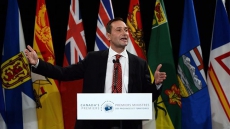VANCOUVER — An emergency response plan for the proposed $5.4-billion Trans Mountain pipeline expansion will remain secret in British Columbia — even though a similar plan was recently made public in Washington state.
Kinder Morgan president Ian Anderson defended his company's decision to publish a heavily redacted version in B.C., saying disclosure of the plan wasn't required by the National Energy Board.
"We in no way want to have this perceived lack of transparency around our emergency response plans as any indication of us wanting to hide anything or keep anything a secret," Anderson said Friday.
"There are very real security concerns that we have with respect to posting our full and complete plans where critical valves and critical access points to the system are delineated."
He said regulation is different in neighbouring Washington, where the Department of Ecology recently published online Kinder Morgan's detailed emergency response plan for that section of the pipeline.
The company has promised to make its full emergency response plan available to the B.C. government, as well as municipalities and first responders along the pipeline route — but not to the public.
Anderson said he's aware of the public's concerns about transparency and vowed his company would work with industry and regulators to define the public disclosure of response plans in the future.
The NEB rejected a demand from the B.C. government in January to compel Kinder Morgan to provide more information about its emergency response plan. A number of municipalities, First Nations and environmental groups supported the province's request.
But a spokesman with the energy board said Friday that although the government's request was declined in this case, the board would like energy companies in Canada to make their emergency response plans public for existing pipelines.
"Our chairman is not very happy that there's a lack of transparency around these emergency response plans," Darin Barter said. "Canadians deserve to have that information. There's a public will for that information. Industry needs to find a way to make that information public."
Companies are not required to disclose their emergency response plans under Canadian law. Barter said the board is not calling for a legislative change, but for a commitment from industry to be more transparent.
He said chairman Peter Watson sent a letter on Feb. 5 about the issue to the Canadian Energy Pipeline Association. A spokesman for the association said it received the letter and will be discussing how to meet the NEB's expectations.
The proposed Trans Mountain expansion would triple the bitumen-carrying capacity with the laying of almost 1,000 kilometres of new pipe near a pre-existing pipeline that runs from Edmonton to Burnaby, B.C.
In Washington, the pipeline would cross through to Puget Sound. The state's Department of Ecology posted Kinder Morgan's emergency response plan online between Jan. 9 and Feb. 18 as part of a public consultation process. Members of the public remain free to request it at any time, said preparedness section manager Linda Pilkey-Jarvis.
The 383-page document includes information about every section of the pipeline, including wall thickness, where it crosses water and peak volumes. It also details response timelines, locations of shutoff valves and "worst case scenarios" for different areas.
B.C.'s Environment Ministry said the province continues to call on Kinder Morgan to release more information about its emergency management program.
A statement from the ministry said the company has committed to consult with the province, as well as other parties, in developing its emergency management program.





